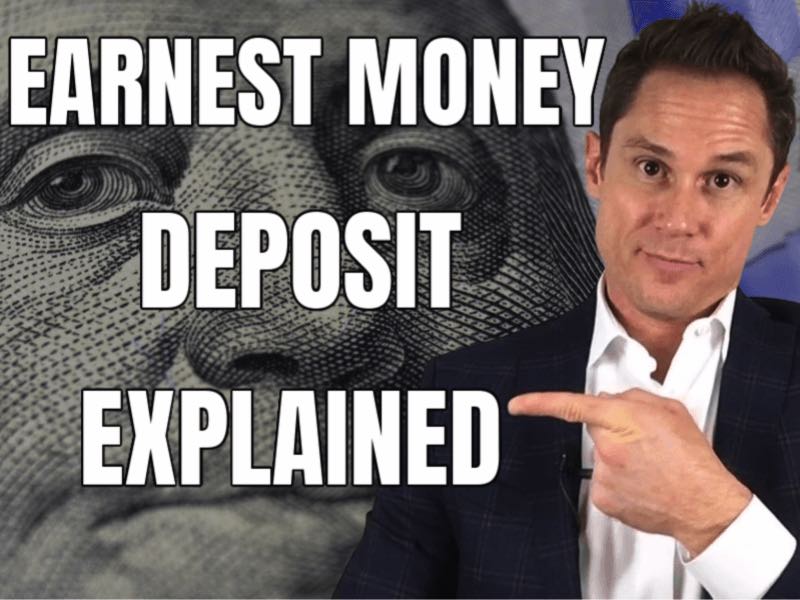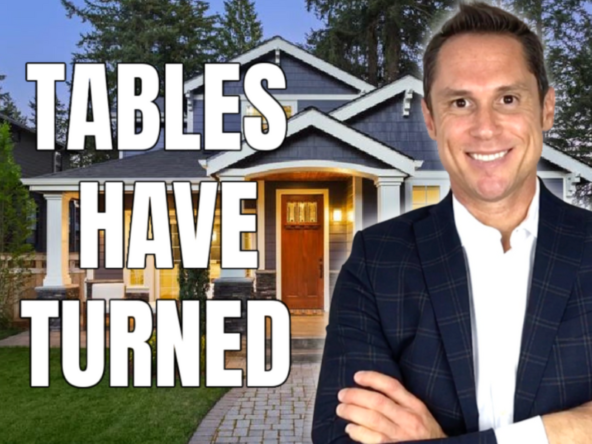What is earnest money when buying a house? How much is it? How does it work? What’s the difference between an earnest money deposit and a down payment?
Earnest money, also known as a home deposit, escrow deposit, or good faith money is one of those terms in real estate that can be a bit puzzling, especially if you’ve never heard it before.
The term earnest money is what’s given by a buyer to show they’re sincere or earnest about purchasing a home. You can think of it almost like a security deposit.
While it seems pretty straightforward, dealing with earnest money deposits (EMD) can be a bit challenging if a purchase cancels. Therefore if you’re buying or selling a home it’s important to know the details about earnest money. If you don’t know the ins and outs it might cost you a lot of time, money, or both.
Comprehending Earnest Money
When a seller accepts an offer from a buyer the home is now under contract. When a home is under contract the seller takes their home off the market and can’t accept an offer from other buyers. However, just because a home is under contract does not mean the buyer will eventually buy it.
The buyer still has to have the home inspection and appraisal done which take time. Not to mention, they still need to have their loan approved if they’re not paying cash. Therefore the seller needs an incentive to take their home off the market to have these things done because they’ll miss out on any other offers they could have accepted if the deal does go sideways. If the buyer cancels, the seller would need to put their home back on the market and repeat the process again. As you can see, if you’re a seller, it’s not ideal.
Earnest Money Separates The Serious From The Curious
It shows the seller you’re the real deal and you’re sincere about buying their home. Essentially, earnest money is a form of protection for the seller to keep from getting played like a fiddle. Without it, a buyer can walk away from a transaction for any given reason. If a buyer does decide not to purchase a home without an acceptable reason that would be pre-determined in the contract, the seller would be entitled to keep the buyer’s deposit.
Think about it. If there wasn’t an earnest money deposit a buyer could enter into contract with multiple sellers at the same time, have all of them take their homes off the market, the sellers wouldn’t be able to accept any other offers, and the buyer could wait until the last minute and walk away from any or all of properties just because they changed their mind and there wouldn’t be any negative consequences to the buyer.
How Much Earnest Money Is Enough?
Usually, earnest money deposits are 1-3% of the purchase price. How much earnest money you should offer is going to depend on the market you’re in.
In a slow market when a property’s been sitting for a while, you might not need to deposit 3%. However, in a hot market where there are bidding wars and you’re competing with multiple buyers, some of which might be cash buyers, it might be a good strategy to go above 3% to have your offer accepted.
As a buyer you should consult with your real estate agent about how much earnest money you should offer. There can be a big difference between 1 and 3 percent depending on the purchase price of a home. For example, if you’re buying a home for $800K, 1% would be $8K, while 3% would be $24K. That’s a $16K swing which is nothing to sneeze at.
Keep in mind, most sellers aren’t going to give as much weight to the amount of earnest money you deposit as they would more important factors like how much you’re putting down and how soon you can close escrow. That said, consult with your realtor to determine the best combination of terms to offer when you purchase a home.
How Does Earnest Money Work?
Once your offer is accepted you will be required to transfer your earnest money deposit to an escrow company. An escrow company is a neutral, third party that will hold the funds in an escrow account until the sale closes. Upon closing the earnest money will then go towards the purchase price of the property or the down payment.
Earnest Money & Down Payment… What’s the Difference?
It’s common for homebuyers to not fully understand the difference between these two terms. Both the earnest money deposit and down payment are paid by the buyer, but they’re not the same thing.
Earnest money is a deposit or pledge made by the buyer to ensure the seller that they seriously want to purchase the home. A down payment is entirely different.
A down payment is money that gets paid toward the purchase price of a home. The difference between the purchase price and the down payment is the amount you’ll get a mortgage for.
For example, if you’re buying a home for $800K and you’re putting $100K down your mortgage amount would be $700K. Any earnest money deposit made would be applied to your down payment on the day of closing.
The down payment amount you decide to go with depends on the mortgage program you choose. Consult with your loan officer to determine how much you should put down when you buy a house.
Reasons Earnest Money Is Returned to a Buyer
A standard residential purchase contract has 3 built-in contingencies that would allow a buyer to have their earnest money reimbursed. You can also add other contingencies that would allow you to be reimbursed your earnest money deposit.
For example, you might add a contingency for the sale of an existing home. In this case, if you can’t complete the sale of a home you currently own before you close on the next home, you’d be able to get your money back.
However, the more contingencies added to a deal the less appealing the offer is going to be to the seller. Be mindful of this because it will decrease your chances of having your offer accepted.
With that said, the 3 main contingencies that are baked into a standard purchase contract are:
1. Inspection Contingency
Every inspector will find something wrong with any home, even with new construction homes. If there are minor defects most of the time they can be fixed. As a buyer, you can ask the seller to make minor repairs or you can simply accept them if you don’t want to mess around and go back and forth.
On the other hand, if the defect is big enough and the seller won’t fix the issue, the expense of making the repair might be too big to justify the current price, in which case you’d want to renegotiate. An example of this could be if the home has structural problems. It can also be costly if the home needs a new roof or new HVAC system.
If you can’t come to an agreement with the seller in regards to repairs within the inspection contingency time frame your earnest money would be returned to you.
2. Appraisal Contingency
If the home doesn’t appraise for the selling price the lender isn’t going to give you a mortgage because if you don’t pay your mortgage and the lender needs to unload your property it will be extremely difficult for them to get their money back.
Also, if the home appraises for less than the sales price as a buyer you’re not going to be too fired up about paying more for the home than it’s worth in a normal market. As a buyer, you can always ask the seller to lower the price or maybe split the difference. It’s negotiable. If you can’t work something out with the seller you’d get your earnest money back.
In a hot market, people have less of a problem paying more than a home’s appraised value. Many buyers can justify paying more than the value if there’s limited inventory and they genuinely love the home. In this case, the buyer would need to come to the closing table with the difference between the selling price and the appraised value on top of your down payment and any closing costs.
3. Loan Contingency
Provided you’re financing, the loan contingency states you have a certain number of days to secure your financing and remove your loan contingency.
If you can’t secure your financing within the specified time frame – bc maybe you lost your job, God forbid – you would be entitled to get your deposit back provided you inform the seller in writing before your loan contingency expires.
Reasons Buyers Lose Their Earnest Money
One reason a buyer would lose their earnest money deposit would be if they don’t respect the contractual timelines. The contract is there for a reason. It’s to ensure people follow through on what they’ve said or documented they’re going to do.
If a buyer disregards the deadlines in the contract without following through with the purchase they could lose their deposit.
For example, if a buyer doesn’t remove their inspection or appraisal contingency in time, or if they’re not able to secure their financing by the due date, the seller would be able to keep a buyer’s earnest money.
Another reason a buyer could lose their EMD would be if they simply changed their mind and backed out on buying the home without connecting the decision to a contingency in the contract. For example, if a buyer found a better deal decides to cancel the purchase the seller would be allowed to keep the earnest money.
This is why it’s important to be 100% sold on a home if you’re going to enter into contract.
Earnest Money Disagreements
What happens if a deal cancels and there’s a dispute in regards to the release of an earnest money deposit?
From time to time there will be disagreements between a buyer and seller in regards to earnest money when a deal cancels. The purchase of a home can be a very emotional experience. Many times when emotion is high, logic is low.
Even though it might be clear as day as to which party a deposit should go to, sometimes disputes arise.
For example, if a buyer has removed all their contingencies and decides they want to cancel the purchase of a home because they simply changed their mind it’s pretty clear the seller would be entitled to receive the earnest money deposit. However, if the buyer disagrees the escrow company would have to hold the funds until the issue is resolved.
If the issue can’t be resolved between the two parties the deposit would continue to be held in the escrow account until the dispute is settled by mediation, arbitration, or the court system. In this case, once it’s been decided by the authorities as to who the money goes to it would then be dispersed accordingly by the escrow company.
Don’t worry. This isn’t the norm, but it can happen. When it does happen it’s usually black and white about who the money should go to.
In Summary
You should now have a solid understanding of how earnest works. Remember to work closely with your real estate agent so you don’t let any contingencies expire. If you have any other questions about earnest money please feel free to contact us.





